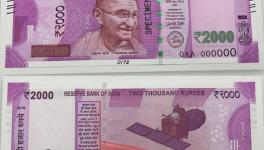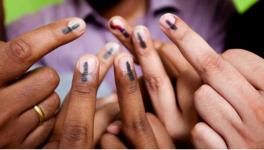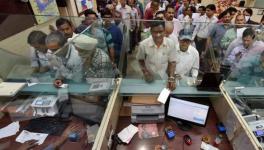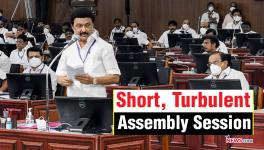1 Out of 6 MSME Loans Under Pandemic Package Have Turned Into NPAs
Representational use only.Image Courtesy: Flickr
New Delhi: Thousands of MSMES in India, one of the largest employment sectors in India, are reeling under severe financial stress, with bank loan accounts of one out six such units turning into non-performing assets (NPAs) or bad loans.
These loans had been given under the Centre’s pandemic package to perk up the sagging fortunes of the medium, small and micro enterprises or MSMES, which had been battered first by demonetisation, then by Goods and Services Tax (GST), followed by two years of unplanned pandemic-induced lockdown.
According to an RTI (Right to Information) reply obtained by The Indian Express, one in very six loans disbursed under the Emergency Credit Line Guarantee Scheme (ECLGS), launched in May 2020, have turned NPAs in just 27 months, adding to the burden of public sector banks.
Read Also: Modi Govt is Blind to the Crushing Jobs Crisis
The defaults are mainly by small businesses that fall in the lower end of the loan bands (up to Rs 20 lakh), as per data revealed by National Credit Guarantee Trustee Company Ltd (NCGTC), a firm set by the Finance Ministry to manage and provide guarantees to these loans.
According to NCGTC’s RTI reply, “loans to 16.22 lakh accounts, or 16.4 per cent of the total 98.86 lakh accounts, disbursed since May 2020 turned into NPAs”, says the IE report.
“While the total NPAs or bad loans, as per the RTI response, dated August 25 this year stood at Rs 11,893.06 crore, the total loan amount disbursed till August 25 this year amounted to Rs 2,81,375.99 crore,” said the report.
Also, under the package, the quantum of loans to be given by banks had been increased from Rs 50 crore initially and eventually the Rs 500 crore ceiling was removed in 2021.
Read Also: SMBs Long for Govt Intervention, Stimulus Evades Industry Finds Report
The loans given to MSMEs had a two-year moratorium and the interest rate was capped at 9.25% for banks and 14% for non-banking financial companies or NBFCs.
These loans, given under ECGLS 1.0, were to turn into NPAs if unpaid three months after the two-year moratorium ends. Clearly, this is what has happened, leading to the huge pile-up of NPAs.
The IE report said it tried to get a response from the Finance Ministry, NCGTC, but failed to get it till the time of publishing the report.
It may be recalled that the MSME sector was worst hit by the ill-planned lockdown, with one report estimating that at least 35% of them had shut shop by June 2020.
A report by FICCI-NBA last month had also flagged that NPAs in the MSME sector may rise in the next six month.
“Some of the high NPA risk sectors identified by respondent bankers in the survey included aviation, tourism and hospitality, power, and retail trade. Sixty five per cent of the respondent banks expect NPAs in the MSME sector to increase in the next six months,” says a Business Standard report.
According to a survey by All India Manufacturers Organisation in June 2020, “as much as 35% of micro, small, medium enterprises (MSME) and 37% of self- employed entrepreneurs have begun shutting their businesses seeing no chance of recovery amid the COVID-19 outbreak and over two months of lockdown measures.”
The survey was conducted online between May 24 and May 30 in which a total of 46,425 self-employed individuals, MSME owners, corporate employers and employees participated. Notably, the survey was conducted after the Central government announced a Rs 20 lakh crore financial package termed ‘Atmanirbhar Bharat’ package.
Hit by rising raw material prices, poor sales and mounting loans, the section that has been hit most are lakhs of workers employed by the MSMEs. About 70% respondents in the AIMO survey said they would reduce workforce to keep themselves afloat.
Even a parliamentary standing committee report in July 2021 had cautioned against 25% MSMEs loans going bad due to the “inadequate” government recovery package.
"The committee observes that the stimulus package announced by the government for the economic revival from the pandemic hit economy has been found to be inadequate as the measures adopted were more of loan offering and long-term measures instead of improving the cash flow to generate demand as immediate relief," it said.
In its submission, the panel noted that MSMEs were facing an acute cash crunch and needed immediate liquidity to cope with the unprecedented circumstance.
"It is estimated that almost 25% of MSME loans could slip into default as several MSMEs are finding it tough to draw working capital from banks," the associations told the committee, as per the report.
"Availability of soft loans to MSMEs at minimal interest rate of 3-4 per cent with extended repayment tenure, easy land acquisition, less parameters of compliances etc could help in developing import substitution in the country," , the report had suggested.
Get the latest reports & analysis with people's perspective on Protests, movements & deep analytical videos, discussions of the current affairs in your Telegram app. Subscribe to NewsClick's Telegram channel & get Real-Time updates on stories, as they get published on our website.
























